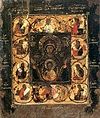

| Previous day | Next day |
| Old Style
November 27
|
Sunday |
New Style
December 10
|
|
27th Sunday after Pentecost.
Tone 2.
Nativity Fast. |
Fish, wine and oil allowed.
|
![]() Commemoration of the Miracle of the Weeping Icon of the Most Holy Theotokos “Of the Sign” at Novgorod (1170).
Commemoration of the Miracle of the Weeping Icon of the Most Holy Theotokos “Of the Sign” at Novgorod (1170). ![]() Great-martyr James the Persian (421).
Great-martyr James the Persian (421). ![]() St. Palladius of Thessalonica (6th c.-7th c.).
St. Palladius of Thessalonica (6th c.-7th c.). ![]() Uncovering of the relics of St. Vsevolod (in baptism Gabriel), prince and wonderworker of Pskov (1192).
Uncovering of the relics of St. Vsevolod (in baptism Gabriel), prince and wonderworker of Pskov (1192). ![]() St. James, bishop and wonderworker of Rostov (1392). St. Andrew Ogorodnikov, fool-for-Christ, of Simbirsk (1841). Synaxis of the New Martyrs and Confessors of Radonezh.
St. James, bishop and wonderworker of Rostov (1392). St. Andrew Ogorodnikov, fool-for-Christ, of Simbirsk (1841). Synaxis of the New Martyrs and Confessors of Radonezh.
17 Monk-martyrs in India (4th c.). St. Romanus the Wonderworker, of Cilicia, near Antioch (5th c.). St. Diodorus, founder of Yeriegorsk Monastery (Solovki) (1633).
New Hieromartyrs Nicholas (Dobronravov), archbishop of Vladimir, Nikon (Belyaev), archimandrite, of the Staro-Golutvin Monastery (Kolomna), Ioasaph (Boyev), archimandrite, of Nikolskoye Monastery (Moscow), Nicholas (Saltykov), hieromonk of the St. Nicholas-Peshnosha Monastery (Moscow), and Apollos (Fedoseyev), hieromonk, of Moscow (1937). New Hieromartyr Cronides, archimandrite, and with him Seraphim (Krestianinov), abbot, and Xenophont (Bondarenko), hieromonk, all of St. Sergius Lavra (1937).
Icons of the Most Holy Theotokos “Of the Sign”: “Kursk Root” (1295) “Of Abalak” (1637), “Of Tsarskoe Selo,” and “Of Seraphimo-Ponetaev.” (1879)
St. Pinuphrius of Egypt (4th c.). St. Palladius, bishop of Elenopolis, author of The Lausaic History (ca. 430). St. Maximus of Riez (ca. 460). St. Nathaniel of Nitria (6th c.). St. Virgil, bishop of Salzburg, Irish missionary (784). St. Theodosius of Turnovo, monastic founder at Mt. Kelifarevo (1363).
Repose of Hieromonk Athanasius of Iveron, Mt. Athos (1973).
Articles
 Greatmartyr James the Persian |
 Saint Romanus the WonderworkerSaint Romanus the Wonderworker was born in the city of Rosa and lived an ascetical life on the outskirts of Antioch, acquiring the gifts of clairvoyance and healing. |
 Icon of the Mother of God “Kursk-Root”The Kursk Root Icon of the Mother of God “Of the Sign” is one of the most ancient icons of the Russian Church. |
 Icon of the Mother of God “Seraphim-Ponetaevka”Six years after it was painted, the icon became known for its numerous miracles and became the chief holy item of the monastery. |







